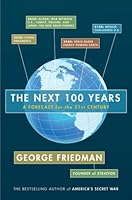I just finished George Friedman‘s “The Next 100 Years: A Forecast for the 21st Century.” While this is a great book for anyone seeking to understand the bounded reality of geopolitics, sources of America’s pre-eminence, and limitations on international relations in the coming decades, it has flaws that I found increasingly apparent as the book went on — some of which may just be the fact that we’re trapped in our own era.
Friedman runs a private intelligence and forecasting company called Stratfor. There’s so little nonsense in his approach that it seems almost bloodless, but it clearly isn’t. Instead, his informed rationality untangles many social issues and lays them out in an orderly and meaningful way. However, he seems pretty entrenched in a mental paradigm that has not yet integrated three major possibilities that might disrupt the world in the coming years — cyberwar (war against or through computer networks), long-range missiles (North Korea’s recent tests), and biological agents.
Yet the book is fundamentally brilliant, and the macro issues might render the three areas above moot. It’s unfair to list out Friedman’s observations. You really have to read this to understand how subtle, sensible, and intertwined his thinking can be. Take this passage from a section summarizing the chapter, “Population, Computers, and Culture Wars”:
Falling populations are restructuring the pattern of families and daily lives. Computers are transforming, simplifying, and focusing the way people think. Corporations are constantly reorganizing the way we work. Between these three factors, love, reason, and daily life are being transformed, and through that transformation American power is growing.
His observations about the 2008 financial crisis are important (e.g., “The U.S. economy has a net worth measured in the hundreds of trillions of dollars. Therefore, a debt crisis measuring a few trillion cannot destroy it.”). His breakdown of world power relationships brings order to the froth of network and cable news sensationalism (e.g., Iran is isolated and limited in possibilities by many major forces, as well as geography). His geopolitical pragmatism grounds us in basic facts (e.g., the US is the only power straddling two oceans which also possesses a significant navy — this fact along with others means that the centers of power in the 21st century will be in North America).
But I was left wondering if he’s missing his own point, which is, “Be practical. Expect the impossible.”As recent stories on hacks into our electrical grid show, cyberwar is a real possibility. Yet this isn’t touched on as a possibility in the next 100 years. Perhaps this is because it would ultimately be a nuisance, shut down by real military and economic power, but it bears coverage nonetheless.
I do have a few quibbles with the book as a book. First, a real sore spot for me in a work of non-fiction is the lack of an index. This book cries out for one. At various points, I wanted to flip forward to see how he would handle a tangential issue, but had to read linearly since an index didn’t exist. Second, there are plenty of unreferenced assertions. I love non-fiction books with annotations, and I missed them here. Finally, there was a small error in phrasing at one point talking about divorce trends, where he spoke of the series of spouses many of have as “serial polygamy” instead of “serial monogamy.” They are very different concepts. I know. I used to live in Utah.
Toward the end, some of Friedman’s scenarios sound a little outlandish, but who knows? After all, who could have predicted in 1909 what the 20th century would bring — two World Wars; the shift from a Europe-centric world to an America-centric world; commercial aviation being commonplace; a world in which multiple nations possess atomic weapons; putting men on the moon (and then stopping because it was too expensive and kind of boring); an information network allowing average citizens to access and share unprecedented amounts of textual, visual, and computational knowledge; and social changes like voting rights, civil rights, divorce, and gay rights.
I found this book gripping, intellectually stimulating, and edifying. It’s not perfect, but it’s brilliant. I’d recommend it to anyone with an interest in current events, future trends, and international affairs.
Discussion
1 Thought on "“The Next 100 Years” — Brilliant, Flawed"

![Reblog this post [with Zemanta]](http://img.zemanta.com/reblog_e.png?x-id=e4abf986-2cfc-44af-87ae-8aa9681afaeb)


